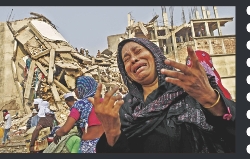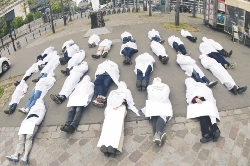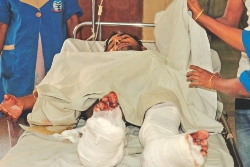The aftermath of disaster
�
�

Desk Report :April 24 will be imprinted in history as the worst industrial tragedy for Bangladesh, and it changed the narrative of the garment sector. Stakeholders started thinking of the well being of the workers responsible for its success.
April 24 will be imprinted in history as the worst industrial tragedy for Bangladesh, and it changed the narrative of the garment sector. Stakeholders started thinking of the well being of the workers responsible for its success.
No event in recent memory has drawn so much attention to Bangladesh from all corners of the world as did the collapse of the Rana Plaza building -- the worst disaster in the garment industry history -- on this day last year.
The haunting images of the despondent rubble of the unauthorised eight-storey building brought out a public outrage against the 'Made in Bangladesh' label, not seen before in the Western world.
The indignation though switched the government, garment factory owners and international retailers in to a pause for thought.
Now, everyone is convinced that business cannot go on as before and the poor workers cannot continue to jeopardise their lives and wellbeing any longer -- for the sake of lining the pockets of factory owners and retailers.
Indeed, they have taken some constructive steps, all with the eye to ensuring that another catastrophic collapse or fire never takes place again.
First off was the inspection drive undertaken by the government and Western retailers to check the plants for structural and fire safety. The exercise started in November last year, and so far 900 factories have been examined.
While small faults were found in all the buildings, only 13 factories were found to be unsafe for operation.
An additional step was undertaken to ensure that workers have the voice to reject unsafe working conditions: the labour law was amended in July last year to give workers the right to freely associate in factories, among others. As of today, some 141 new trade unions have registered with the ministry of labour.
To safeguard the wellbeing of workers, minimum wage was increased 77 percent to Tk 5,300 in December last year. While it fell short of workers' expectations, factory owners insist it is the threshold for the sustainability of their businesses.
On the flipside, Bangladesh still remains the cheapest source of labour in the world, a massive comparative advantage over its competitors.
The government is also reorganising its capacity through empowering the Fire Service and Civil Defence to develop skills and technical expertise to deal with fire, electrical and structural safety issues.
All very well, but when it comes to compensation for the misfortunate Rana Plaza victims that all parties were found badly wanting: none of the Rana Plaza's victims have received the full amount of compensation they were promised, one year on.
While the government provided some financial support, the conduct of 14 of the 29 retailers that sourced from the five factories housed at Rana Plaza has been downright woeful.
IndustriALL, a global union federation, initiated the Rana Plaza Trust Fund to justly compensate the victims, for which a total of $40 million is needed.
All the 29 retailers that sourced from the Rana Plaza factories are bound to contribute to the fund, but 14 have refused to do so. Other retailers, too, have been asked to underwrite the fund chaired by the International Labour Organisation, but a major part of North American retailers did not express any willingness to participate.
British retailer Primark has been the biggest contributor, putting in a total of $12 million for the victims. The other 14 firms have pledged to make donations at some point to the trust fund, which has so far collected $15 million.
The exigency of compensation becomes all the more desperate when one takes a look at the inhumane lives that many of the survivors are leading as a result of the accident.
Some of the injured have become permanently disabled, turning the once breadwinners of the families to suddenly become dependents or, in practical terms, burden for their poor families.
These families should be bestowed the means to stop them for falling into the trap of abject poverty -- a thing they were trying to negotiate with on a daily basis in the first place with their incomes from the cut-sew-trim business.
But what is criminally unfortunate about the tragedy is although 1,135 lives perished, nobody was put behind bars for allowing the illegal structure to be constructed, factories to be set up in the illegal building and forcing workers to join work even when it became evident that the disaster was looming large.
Going forward, the government will have to make negligence and indifference costly so that nobody ever fails to perform their duties to ensure a safe workplace -- and avert it from becoming a death trap. the daily star
Local Time : 0317 Hours, 24 April 2024
|
|









